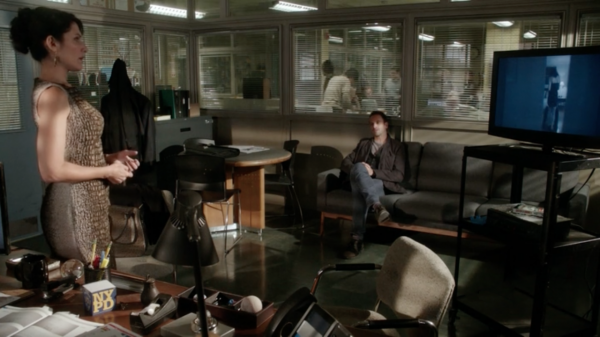
I’m a sucker for procedurals (while also being deeply ambivalent about them), so of course I was going to watch Elementary, CBS’s not-so-new-now take on Sherlock Holmes; I was immediately sold because female Watson. Played by Lucy Liu. And Jonny Lee Miller as a weird, twitchy, tattooed, recovering-addict Sherlock Holmes. I’m beyond over the BBC’s Sherlock, Howling Cabbagepatch’s shark-face, and the disappointing but predictable treatment of domanitrix Irene Adler—not really surprising considering the writers, but I digress.The formulaic nature of procedural mysteries is inexplicably soothing to me, and, however lackluster (and aren’t they the definition of “formulaic”?) they have the serious merit of being one of the only genres to consistently feature sex workers. Sure, they’re usually dead sex workers, but I don’t give up hope. The times they are a-changin’, and live lovable sex workers have carried their weight on some critically acclaimed cable dramas: Deadwood, Copper, Secret Diary of a Call Girl. I have faith that network procedurals will catch up soon.
In a way, Elementary has. For a procedural that features a sex worker body count of zero, the instances of live sex workers on the show are fairly high. I was alert from first watch: while the pilot didn’t have any dead sex worker bodies, I waited for the inevitable. As episodes went on I started to relax and feel hope, and then suddenly, in E08, “The Long Fuse”: Lisa Edelstein, aka Elementary’s first Sex Worker!!! made it through an episode unharmed. She was treated with sympathy as a working-class girl whose escorting career, after paying for grad school and a successful business, was now being used as blackmail against her by a creep who had violated her privacy and filmed their call.
It turned out she was the murderer, but how refreshing to see a sex worker kill (especially such a total jerk) rather than be killed. This pattern of sex workers as lively crooks continued throughout the season. While there wasn’t a complete lack of dead white women, there were also more than enough dead white men, and even an episode that featured no dead people at all. Through all this, no dead sex workers.
But little things that either slid by the first time or barely registered as annoyances hit me harder on second watching, especially in contrast to the essential sweetness of Miller and Liu’s Sherlock and Watson. This is a Sherlock who is still fascinated by puzzles, and like the Arthur Conan Doyle original he’s fueled by compassion and a desire to help people; his attention to detail is (usually) an attention to the world, and to humanity. The moments when he’s too caught up in the abstract to remember humanity aren’t proof of high flying genius; they’re moments of weakness, character flaws, and Liu’s Watson is crucial as she keeps him from taking refuge in the theoretical, forcing him to register the feelings of those around him. Watson begins as his sober companion but she also keeps him human, and that’s a major arc of the first season.
It’s a dynamic made explicit by their treatment of the other characters. Sherlock expresses outrage at at wealth and corruption (he has one specific speech about bankers that still makes me laugh) and has concern for the marginalized and vulnerable (giving a homeless man money for shelter, taking in Live Living Sex Worker Miss Hudson.) His attentiveness to the ignored proves prescient: He asks a secretary “What did [your boss] say your name was?” “He didn’t,” she replies. Sherlock’s consideration of her uncovers that she is the culprit, unnoticed and unsuspected by all, and in his own arrogance—despite knowing her to be the killer—he makes the same mistake, almost getting himself killed. Watson saves the day, FYI. Of course.
This warmth and respect was mostly absent from the treatment of the sex workers. “Rat Race,” the episode with the murderous secretary, has the first reference to sex workers, although no bodies: the original corpse (it’s an episode littered with them; she was a killer with ambition) is discovered through what Sherlock terms the victim’s “predilection for slappers.”
This is a euphemism I never heard before (maybe it’s an English thing?) but Urban Dictionary gives it as “a girl who likes to get fucked.” The slappers in question happen to be pricey escorts, “the more expensive ones his favorites.” Okay then. It’s not the brilliant treatment I remembered, but then again this is E04, and “The Long Fuse” and my pulled-herself-up-by-her-stiletto-straps boo Lisa Cuddy didn’t start the Real Live Sex Worker trend until E08.
Only I was wrong! the first instance of a Procedural Sex Worker isn’t the powerful CEO of “The Long Fuse.” “One Way to Get Off” has that claim with a crime show staple: a trafficking victim of generic Eastern European provenance. Sherlock finds her chained in a basement, and she’s taken away in an ambulance to an unknown future. Let’s not think about the dismal treatment that awaits most “rescued” trafficking survivors. She got rescued by Sherlock!

So, episode eight, “The Long Fuse.” The warmth I remembered turned out to have originated largely from my own starry eyes at seeing a character that resonates so much with me—working class girl gets financial security through sex work, BAM!—represented and not hacked to pieces; while the show implicitly condemned the blackmailer and highlighted what a shit he must have been, the respect I remembered her being regarded with was largely imaginary. As Sherlock shows her the videotape made by the dead blackmailer, he says “When you got into business school you needed a source of income: something to pay your tuition and provide you with seed money for your company. You turned, in your hour of need, to the world’s oldest profession; you took to it with some gusto, I’d say.”
The last sentence floors me; it’s so unnecessary and beyond that, out of character. Here’s a man who likes fucking. He has an active, vigorous, and wide ranging sex life; he’s kind, compassionate, and he declares himself later in the season to despise blackmailers as the lowest of the low. Where, in any of this, does this subtle yet snide insult fit? Why was it necessary to include this?
This stung even more because it was so unexpected. While watching the first time around I’d noticed Joan’s stinging remarks on the subject of sex workers—some warranted (as when an illicit porn movie was filmed in her apartment, using her kitchen implements), most not (“this place smells like stripper,” she declares after Sherlock has hired and arrested two entrepreneurial stripper-thieves. To be fair to Joan, stripper is indeed a very specific smell, a mixture of that godawful Pink Sugar crap, cigarette smoke, alcohol, and foot sweat. I don’t like when it infiltrates my apartment either), but in my memory Joan’s prudishness stood in marked contrast to Sherlock’s acceptance.
Sex workers reappear two episodes later when a Russian spy masquerading as a hotel manager encourages escorts to use her hotel, the better to lure government officials. Only one sex worker gets screen time, a woman in a bar whom Sherlock basically blackmails into talking to him, after listing all the qualities (sartorial, largely—business casual plus garter belt plus eye contact with men equals hooker! now you know) that alerted him to her status as a marginalized person who could be blackmailed. Apparently all bets are off when it comes to sex workers. He’s only got so much decency to spare. Once titillatingly revealed and threatened, the escort line fades away: again sex workers are peripheral to the plot, used largely as sexy scene setting in the same way that other shows use dead sex worker bodies.
In keeping with that theme comes my personal favorite use of sex workers-as-titillating-props, the opening of “The Deductionist.” The strippers here have absolutely fuckall to do with the plot, but they foreshadow the DIY pornographer who defiles Joan’s spatula later in the same episode—we might as well call this the sex work episode. It opens with some music that the dubstep dj at my club probably played a few years ago, and then pans back from two giggling women to reveal Sherlock (face twitchily contorted, as usual) sitting behind them. They do some of the more unrealistic stripper moves I’ve seen yet on TV (the arms in the air flailing! do no actual strippers ever audition for stripper casting calls? Probably not, we mostly value our time and image too highly) before handcuffing Sherlock to a chair and attempting to rob him. The face-pat that one of them gives him just rings so true to me, it’s the same condescendingly dismissive face-pat I give to customers who tell me, for the third time, “Oh fifteen more minutes, come back in fifteen more minutes!” Then they get arrested—surprise! It was all a set up, now we can cut to the real action, although not before Joan wanders into the kitchen to open a window and complain that the place still smells like stripper. Oh, ok then. Just wait til you see what your subletter did in your apartment, Joan, and that stripper stink will be forgotten.
The Joan/subletter porn plot is one of the more annoying and meaningless things to happen on Elementary. Her subletter needs money so he films an amateur unlicensed porn that her landlord uses to evict her; a spatula is compromised along the way, as are Joan’s sensibilities. I actually agree with her about it being a violation, and the guy is clearly a creepy bad boundaries loser, much like some amateur pornographers I’ve known, so I want to just bar him from further discussion. It happened, it sucked, but weren’t the larcenous strippers rad? Future career path, arm flail and all.

Which brings us to the last and actually literally not least of the sex workers on Elementary, the only one to be treated with any respect at all: Ms Hudson. Ms Hudson, a trans woman played in “Snow Angels” by trans actress Candis Cayne, is what Sherlock terms “a muse,” by which he means an erudite girlfriend to a variety of rich men who take care of her: Our Ms Hudson consistently finds herself in the company of powerful men in crisis.” Cool! Why are none of my customers like this? Lately I feel like I’m lucky if they’ve brushed their teeth recently. By the end of the episode tea-loving Ms Hudson has re-cataloged and -organized Sherlock’s library, and though she’s barely on the show through the rest of season one, I have high hopes for her presence in season two.
I cling to Ms Hudson because I have little hope that the treatment of other sex workers will change much. I love the show; I won’t stop watching. (Let’s be real, how could I? It has some of the most diverse casting and well-written characters on network TV, and I will defend its superiority to Sherlock to the death.) But it won’t stop stinging either. This is a show whose main characters treat everyone with consideration and respect. To lump sex workers in with actual villains as some of the few people not worthy of respect and politeness is cheap and out of character, an insult that burns even more for being so unexpected and sloppy.
Elementary airs Thursday nights at 10/9c on CBS.
Previously in “Support Hos“: a review of the BBC series Sherlock.
I binge-watched a bunch of episodes of Elementary at a friend’s place, but had to stop partway after the Russian hotel episode (for pretty much the reasons you mention there – it made me super uncomfortable to see how the sex workers were treated there). I haven’t watched it since then, so my recollection might be a bit off, but I remember being just generally irritated by Holmes’ attitude towards sex workers – it felt like something done to show how unconventional he is, kind of like Alan Shore in Boston Legal. Like, it reduced sex workers to a prop? It also felt cheap to have him talking about sex work as a victimless crime in the episode with the sex slave (at least, that’s how I remember it going down?).
Yeah that’s pretty much my feeling, which bums me out bc I do think it’s worth watching for other reasons. Like I’ll keep watching, but damn! It’s like every few episodes come with a paper cut and lemon juice.
Great essay about the show. I’ve never seen it but not sure I want to. Blue sounds much better.
…business casual plus garter belt plus eye contact with men equals hooker!
That’s where I’ve been going wrong! Seriously, a secretary outfit is perfect for bar pickups. Except in the States, where men are so easily confused.
You turned, in your hour of need, to the world’s oldest profession; you took to it with some gusto, I’d say.
It never changes, does it? It’s never okay for a woman to like sex, especially if she’s not faking it. I’d say the modern Sherlock imported his Victorian attitudes straight from the original.
[…] and Sass on the treatment of sex workers in season 1 of Elementary. It ain’t all good, but it’s better than a […]